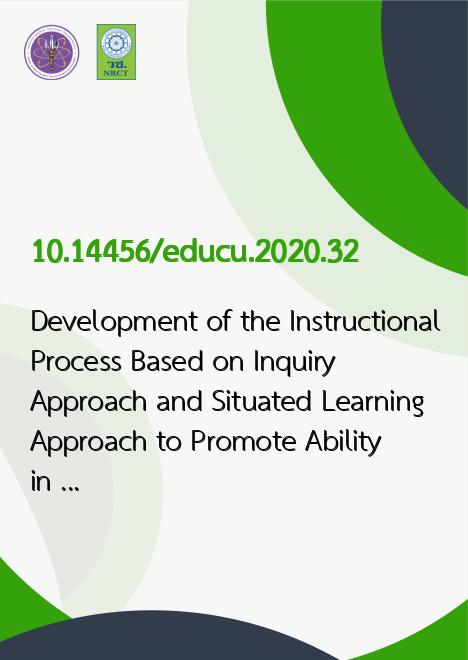
|
Development of the Instructional Process Based on Inquiry Approach and Situated Learning Approach to Promote Ability in Conducting Research of Student Teachers |
|---|---|
| รหัสดีโอไอ | |
| Creator | Patcharaporn Pilasombat |
| Title | Development of the Instructional Process Based on Inquiry Approach and Situated Learning Approach to Promote Ability in Conducting Research of Student Teachers |
| Contributor | Wichai Sawekngam, Amporn Makanong |
| Publisher | Centre for Education Innovation, Print and Online Media |
| Publication Year | 2563 |
| Journal Title | Journal of Education Studies, Chulalongkorn University |
| Journal Vol. | 48 |
| Journal No. | 3 |
| Page no. | 241-257 |
| Keyword | inquiry approach, situated learning approach, ability in conducting research, student teachers |
| URL Website | https://so02.tci-thaijo.org/index.php/EDUCU |
| Website title | Journal of Education Studies, Chulalongkorn University |
| ISSN | 2651-2017 (Online) |
| Abstract | The purposes of this research were: 1) to develop instructional process based on inquiry approach and situated learning approach to promote ability in conducting research in teacher students; and 2) to study efficiency instructional process of the instructional model development. The research design was quasi-experimental research. The study composed of two phases which were the development of the instructional model and the experiment of using the model. The samples were 55 teacher students from 2 classrooms, divided into 2 groups: 30 teacher students as the experimental group and 25 teacher students as the control group. The sample groups were chosen by the use of simple random sampling. The research had conducted for 15 weeks. The research instruments included research assessment, interview and learning log. Data were analyzed by the percentage of average scores, SD and t-test. The results of this research were as follows: 1) the instructional process based on an inquiry approach and a situated learning approach to promote ability of conducting research of student teachers consist of four steps: (1) stimulating interest by using problems in real situation; (2) searching and applying knowledge in real situation; (3) applying gained knowledge in real situation; and (4) exchanging gained knowledge. 2) After using developed instructional model, the experimental group could promote ability in conducting research higher than the control group at a significant level of .05. |